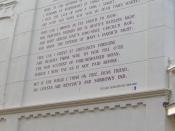Passage of Time
William Shakespeare's fine sonnet, number 73, appears to have a dark, gloomy, and depressing aura about it. However, if you look deeper into it, I think it has an important message and a warning to it. The message has to do with not wasting the days of one's youth, to make every day count because you won't be young forever. The passage of time is mentioned throughout the sonnet, and the effects that time has on a person's body and mind is a constant theme. In the sonnet the persona is addressing a younger person; but I think he is talking to all young people. The sonnet has a universal message in it that is still quite relevant today.
In the first quatrain, Shakespeare is portraying himself as an older person, with the analogy of being in the late autumn or early winter of his life.
He lets us know this through the eyes of the younger person by the line, "thou mayst in me behold when yellow leaves, or none, or few do hang"(1-2). Shakespeare tells me that he is in ill health by referring to his body as temple (religion sometimes refers to your body as temple, I think Shakespeare makes this connection) or a church that is in great disrepair, the interior being exposed to the elements, with the words "Bare ruined choirs"(4). There is a bit of irony here when Shakespeare sets some "sweet birds" (4) where the voices of choir could be heard. The sound of a choir, replaced by song birds reflects a lost of strength. It is a dark, cold, and dreary setting that the author has set us in, Shakespeare also seems to be trembling as his limbs "shake against the cold," in line three. Does...



Shakespeare
My professor gave me a B+ on this paper believe it or not. Everyone is entitled to their opinion Panzer, I don't lie about my grades and yes THIS IS A 2ND COLLEGATE PAPER. Plus I think I quoted the right amount, thank you. Constructive criticism is okay, but get off your highhorse with your highbrow attitude.
6 out of 6 people found this comment useful.